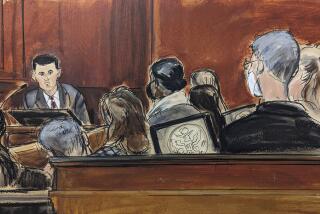THE IRAN--CONTRA HEARINGS : ‘I Am Responsible’--McFarlane
- Share via
WASHINGTON — Three months and two days after he attempted suicide in anguish over the Iran- contra scandal, Robert C. McFarlane told Congress in measured monotones Monday that he accepts responsibility for major parts of the wayward policies that led to the greatest crisis of Ronald Reagan’s presidency.
Reagan’s former national security adviser, in his first substantive public appearance since taking an overdose of Valium on Feb. 9, spent five hours testifying before House and Senate investigating committees as they opened their second week of hearings on the arms sales to Iran and the diversion of funds to the Nicaraguan rebels.
“I have to accept responsibility. . . . I am responsible for what happened,” McFarlane said in describing a critical juncture in the avalanche of events and policy decisions. At another point, when asked if he felt “caught in the middle,” he replied slowly, through tightly pressed lips:
“No. It was my responsibility.”
Visibly Drained
McFarlane ended his day of testimony visibly drained, walking from the hearing room hand-in-hand with his wife. “It was a long day for him,” said Senate counsel Arthur L. Liman, who conducted Monday’s questioning. “It’s not easy for him to revisit all these events.”
Liman, whose questioning lacked the aggressive edge he had employed last week in briskly examining retired Air Force Maj. Gen. Richard V. Secord, allowed McFarlane at times to give rambling answers. “Well, I guess I’m wandering off the point,” McFarlane acknowledged once.
‘What’s the Lesson?’
After Liman led McFarlane through a chronology of events involving both the complex set of arms sales to Iran and the flow of aid to the contras, he concluded the day’s questions by asking: “How did it happen? What’s the lesson?”
“You deserve a thorough answer that is utterly missing from any that’s been made today,” McFarlane responded. “ . . . And I’ll be glad tomorrow, if you have the time, to provide some context that I think doesn’t mitigate, but makes more clear just why this did happen.”
Observers noted that McFarlane’s hair is noticeably grayer than it was six months ago when the Iran-contra initiatives began unraveling. While he retained his composure throughout his testimony, his eyes appeared to glisten at times and his voice occasionally seemed to thicken.
Took Sips of Water
He took repeated sips from an often-refilled water glass on the witness table. He explained to an interviewer last week that his medication causes him to experience “an incredible dryness.”
In a 10-minute opening statement, McFarlane spoke of “one matter which weighs particularly heavy with me . . . (which is) a matter of remorse--even anguish.” That, he said, was his response in 1985 to congressional inquiries about whether he or members of the NSC staff were adhering to the law banning any U.S. aid to the Nicaraguan rebels.
He said at the time in letters to members of Congress that all acts by the NSC were “in compliance with both the spirit and the letter” of the law. This response, he testified Monday, was “too categorical.”
McFarlane is certain to be questioned closely--and, some sources predict, even harshly--by members of the committees this week on that point. In preparation for those questions, congressional aides placed on a wall of the hearing room several 5-foot-tall enlargements of the language of the congressional ban on aid to the contras.
More to Read
Sign up for Essential California
The most important California stories and recommendations in your inbox every morning.
You may occasionally receive promotional content from the Los Angeles Times.













